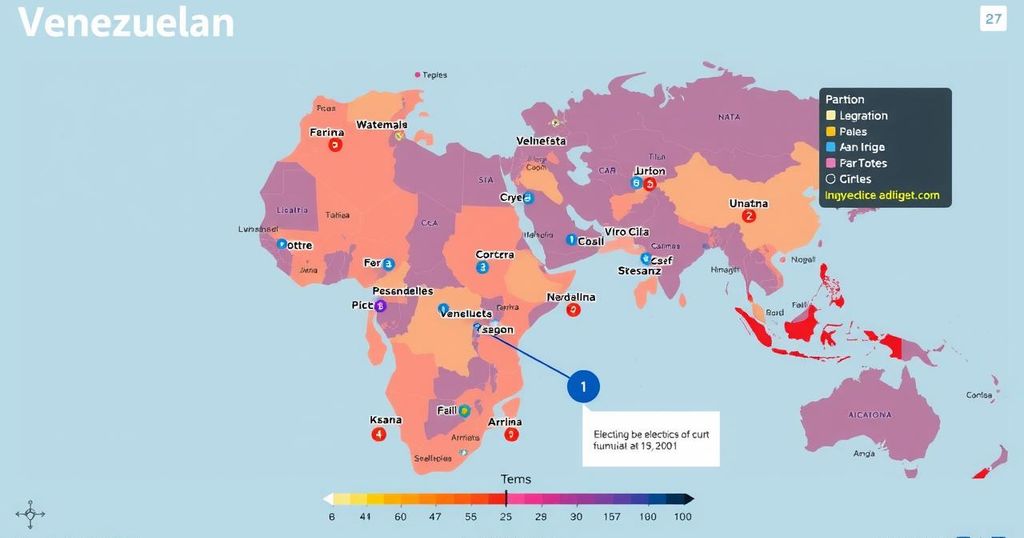Recap of the Controversial 2024 Venezuelan Elections

In the aftermath of the 2024 Venezuelan presidential election held on July 28, Nicolás Maduro declared victory, which was contested by opposition leader Edmundo González Urrutia. The National Electoral Council supported Maduro’s claims, while the opposition accused the election of fraud. International responses varied, with the U.S. recognizing González Urrutia as president-elect, amid calls for transparency regarding electoral outcomes.
On July 28, 2024, Venezuelans participated in a much-anticipated presidential election where both incumbent Nicolás Maduro and opposition candidate Edmundo González Urrutia proclaimed victory. The National Electoral Council (CNE) reported that Maduro received 51% of the votes, whereas González Urrutia garnered 44%. However, the opposition disputed these results, contending the election was fraught with irregularities and accusing the CNE of fraud. Professor MJ Peterson from the University of Massachusetts emphasized that this episode exemplifies Maduro’s ongoing efforts to maintain power.
Due to earlier government restrictions, the opposition’s favored candidate, María Corina Machado, was barred from running, effectively positioning her representative, González Urrutia, as the key alternative to Maduro. Following the election, the CNE did not release supporting voting records, raising suspicions about their declared results. The Democratic Unitary Platform (PUD) countered the CNE’s claims by publishing their own tallies from voting machines, which reportedly showed González Urrutia winning by a significant margin.
International responses have varied, with the United States Secretary of State Antony J. Blinken expressing support for the Venezuelan people and denouncing the CNE’s legitimacy. The U.S. has recognized González Urrutia as the legitimate president-elect, while several nations including the European Union and neighboring Brazil and Colombia have demanded the release of the election’s voting records. Conversely, countries like Russia and China congratulated Maduro on his declared victory.
In September, persecution by Maduro’s government forced González Urrutia into exile, following claims he had falsified documents. He reported that he was coerced into recognizing Maduro’s win for his safety. On October 16, Maduro announced plans for his third-term inauguration, signaling his intent to remain in power despite widespread international criticism and calls for accountability regarding the election process. Meanwhile, Machado remains hopeful for a favorable outcome for González Urrutia’s legitimate presidency, contingent upon upcoming actions by the Venezuelan military. Concerns surrounding electoral integrity persist, as highlighted by the UN’s investigation into allegations of a stolen election. The political landscape remains fraught with tension as Venezuela approaches its historic presidential transition slated for January 10, 2025.
The political situation in Venezuela has been turbulent, particularly since Nicolás Maduro assumed the presidency amid allegations of electoral fraud in 2013. The country has faced economic decline, humanitarian crises, and significant political opposition movements. The election of 2024 was further complicated by the exclusion of prominent opposition figure María Corina Machado due to government restrictions, leaving Edmundo González Urrutia as the representative for the opposition. The National Electoral Council (CNE) has been criticized for its inability to provide transparent voting records, raising significant doubt about the integrity of the electoral process. This has led to international scrutiny and accusations of electoral misconduct.
The recent Venezuelan election exemplifies the continuing struggle for democratic legitimacy in the country. With both Nicolás Maduro and Edmundo González Urrutia claiming victory, the dispute over election results underscores deep divisions within Venezuelan society and politics. The absence of verifiable voting records, compounded by the international community’s condemnation of the CNE’s actions, creates an uncertain future. As the inauguration approaches, the potential for increased unrest remains high, reliant on both domestic and international political maneuvers.
Original Source: dailycollegian.com








